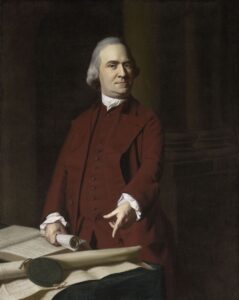Samuel Adams Biography and Works.

Samuel Adams was born on September 27, 1722. He was an American Statesman, political philosopher and one of the Founding Fathers of the United States. As a politician in colonial Massachusetts, Adams was a leader of the movement that became the American Revolution, and was one of the architects of the principles of American republicanism that shaped the political culture of the United States. He was a second cousin to President John Adams.
A graduate of Harvard College, he was an unsuccessful businessman and tax collector before concentrating on politics.
After Parliament passed the ‘Coercive Acts’ in 1774, Adams attended the Continental Congress in Philadelphia, which was convened to coordinate a colonial response. He helped to guide the Congress towards issuing the Declaration of Independence in 1776, and helped draft the Articles of Confederation and the Massachusetts Constitution. Adams returned to Massachusetts after the American Revolution, where he served in the state senate and was eventually elected the governor.
Samuel Adams is a controversial figure in American history. Accounts written in the 19th century praised him as someone who had been steering his fellow colonists towards independence long before the outbreak of the Revolutionary War This view gave way to negative assessments of Adams in the first half of the 20th century, in which he was portrayed as a master of propaganda who provoked mob violence to achieve his goals. Both of these interpretations have been challenged by some modern scholars, who argue that these traditional depictions of Adams are myths contradicted by the historical record.
Trivia
The younger Samuel Adams attended the Boston Latin School.
Quote
“How strangely will the Tools of a Tyrant pervert the plain Meaning of Words!
- What is meant by Database Management System?
- Discuss the advantages and drawbacks of database.
- What do you mean by database ? Discuss its Characteristics.
- What is Data Mining?
- What are the conditions of communication?
- What do you mean by business communication ?
- organization / Differentiate between classical and modern theory of organization
- What is forecasting






